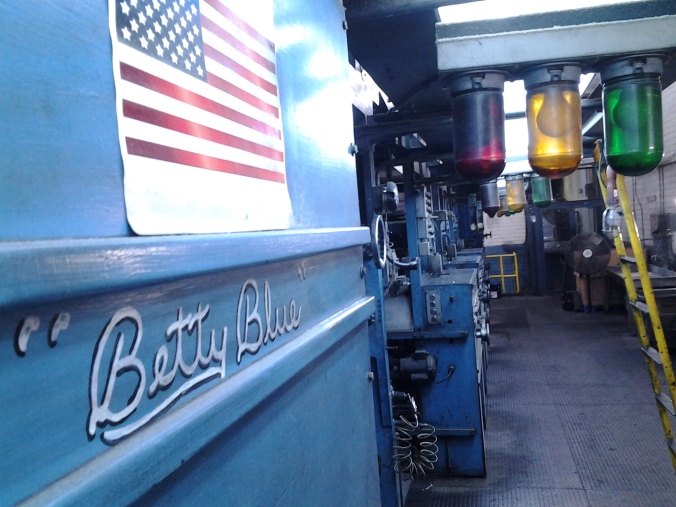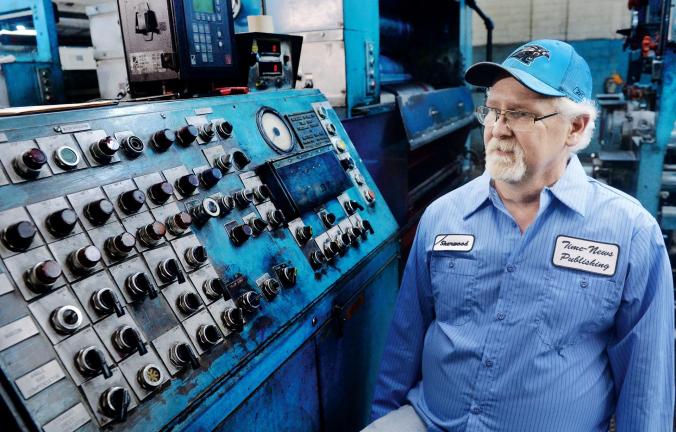“Well, my last night as a newspaper pressman at The Times News is here. 40 page, 5 section paper. Lets get this started.”
— Sherwood Bland, Times-News pressroom foreman
In the history of journalism there is probably no greater cliche than the frazzled editor racing into a large room filled with incredibly noisy machinery and screaming “STOP THE PRESSES!!!!”
Take it from me, it almost never, ever happens that way — except in movies, of course. No, editors in my time picked up the phone if there was a problem and called the pressroom foreman for that particular shift and said, “We need a remake on A1 for a head bust. You can fix it on the fly. We’ll have the new version in a second. Oh yeah, black plate only.” Breaking down this highly technical jargon, this means: The front page needs to be changed because we screwed up a headline. The corrected version is on its way. No need to stop immediately because this problem won’t get our asses sued. Because this is just the black lettering in the headline only one plate needs to be switched.
Now for something that could get our asses sued we might actually say ‘stop the presses” but because time is money we would usually explain why. Believe me, pressroom guys never want to stop the press unless they absolutely have to. It’s a delicate piece of machinery that looks anything but — massive, formidable, impressive, unbreakable — but one web glitch, one thrown piece of gear and the entire thing can lock up. When that happens, daily delivery of newspaper to customers can be impacted. And, well, that’s not good news.

I hope Sherwood doesn’t mind my grabbing this photo from his Facebook page.
Sunday morning the presses stopped at the Times-News for the last time. The call to do so happened from a corporate office after consulting with accountants and other executives. It was relayed to the longtime pressroom foreman Sherwood Bland in a meeting a few weeks ago. Starting Monday the Burlington Times-News will be printed on a high-tech and nearly new press at the Fayetteville Observer nearly 90 minutes away. The aging press at the Burlington office on South Main Street — the one with “Betty Blue” stenciled on one panel by a former pressman named Paul White — will go silent after decades of providing Times-News readers with a daily newspaper. it did so when the TN was the Daily Times-News, when it was an afternoon newspaper, when it became a morning newspaper, as a lot of reporting became a digital enterprise, through five or six rounds of ownership changes and as newer presses were able to produce far more pages in color and at a faster rate. Betty Blue printed a lot of other things at one time or another over the years — newspapers for area high schools, chamber of commerce sections, the Elon campus newspaper. Most recently, its jobs were limited to the Times-News and other publications in the same company — most notably the Asheboro Courier-Tribune and Lexington Dispatch. See video of the last press run here.
A lot of things have changed in the newspaper industry as it makes the ragged transition from print to fully digital publication but this will be among the biggest for Burlington. Yes, last year about this same time the newsroom lost its copydesk, what I consider the heart of a newspaper operation. They are the people who write the headlines, design the pages, edit copy, place the photos, write captions and make sure the completed pages are ready by deadline to go on the press. Today much of that is done at a site in Austin, Texas where hundreds of other newspapers are assembled in similar fashions. Everything produced there follows a standard format. There isn’t much flexibility on the newsroom’s end. Losing that, and the people was sad. But losing the press is a more symbolic matter for longtime readers. Last year almost no one I talked to in the community lamented the loss of the copydesk but at least five have mentioned that they “can’t believe the paper won’t be printed in Burlington anymore.”
For a newsroom — and longtime journalists — it’s a blow. The press operators are artists at what they do. It’s a highly advanced skill to balance a press and its use of ink, correctly register photographs, find and replace problems with plates, maintain the machinery and do it all in a flash of time. They’re on deadline, too. More than a few times alert pressmen found errors that had escaped the attention of newsroom editors and saved their bacon. The Times-News will miss every single one of them. Keeping a press of this advanced age going took some doing. The Times-News crew did so with aplomb.
The biggest changes? Some press operators are moving to Fayetteville to take jobs there. A few will be laid off. Sherwood, my longtime friend and colleague, will take over as production manager for the Times-News, Courier-Tribune and Dispatch and also oversee plant operations in Burlington. I’m glad he’s staying. Sherwood was working in the pressroom in Burlington when I left in 1992, when I returned in 2007 and when I left again in November. He’s been as reliable — actually more reliable — than the press itself.
The deadline for stories will be a little earlier than before, which means some sport events that finish in the 10:30 to 11 p.m. range probably won’t make the newspaper. I know sports editor Bob Sutton too well and can say he’s very concerned about those times when a Duke basketball game ending at around 9 p.m. gets in the newspaper and a UNC game ending at 11 does not. Please try to give him a break. The deadlines aren’t his decision.
On the positive side, the newspaper will likely look sharper. The new press is incredible with far more potential to produce color on a larger number of pages.
Were I still at the Times-News I would miss the press. The past few years I wasn’t at the office when it cranked up late at night or early in the morning. But I remember the smell of ink that permeates the building as it starts and the incredible noise it made when going full bore. I liked to walk there during the day and just look it over — a reliable symbol of a great profession and time.
In my career, I only have one true “stop the press” kind of story. I had nothing to do with it, but it was memorable. I was working in sports at the Times-News on the morning of Jan. 28, 1986. We were still an afternoon paper then. Deadline was over and we were about to head to lunch shortly after 11:30 a.m. when news flashed that the Space Shuttle Challenger had exploded. Editor Don Bolden placed the call to stop the press so we could remake the top of the front page to get in this major breaking news. The story kept growing every minute and fresh information was being produced by the Associated Press. The newsroom had the press started and stopped so many times I lost count as remake followed remake. Finally, the press couldn’t take it anymore. It caught on fire. The blaze was quickly contained and no one was injured. But it took several days to repair it. In the meantime, we trucked our plates to one of our company’s newspapers in Gastonia so we could keep publication going.
Sigh.
For historic purposes, Sherwood documented some lasts on social media early Sunday morning:
Last page (a remake, no less) — from sports, always sports unless it was election night or something — 12:25 a.m.; last plate, 12:48 a.m. And the final press run of the Times-News at the Main Street building, unless something weird happens, ended at 2:12 a.m. I salute all the press men and women throughout Times-News history. Remember their work, folks. It was important.
-30-

Sherwood Bland on one of his last days working in the Times-News pressroom. Times-News photographer Steven Mantilla got the shot.
You paint a great picture here Madison. Should be displayed on ink and paper. I’m looking forward to the challanges the future holds for me. Ink will always be in my blood, but not on my hands anymore… or my arms, my hair, my face …. 😉
LikeLike
Thanks Sherwood and you produced great work in all that ink. I know you’ll do great in this next adventure and the hours are bound to be better! Best wishes and now I can stop by your office inthe daytime!
LikeLike
Madison, unfortunately the scenario you describe has happened or is happening everywhere. Newspapers are losing their individual identities as they are produced off site at a central hub somewhere else, maybe hundreds of miles away in an effort to obtain the most profit. In the process, the paper’s personality suffers. It becomes a clone and no longer has that home grown feel.
Our own paper, for which I was the Creative Services, Systems and Production Manager for 13 years, underwent a similar upheaval. The press is quiet now. The graphics room is empty. There are far less people in the building now than there was a few years ago. It breaks my heart.
Sadly, I had to leave, but I DO miss the culture, the deadlines and the people.
LikeLike
It’s truly a shame. At my old office they could almost produce the product in an out building. And like you I miss the daily interaction — the hum of the business. The upside of leaving the business? Better hours and less stress.
Thanks for the response. It is a sad time for sure.
LikeLike